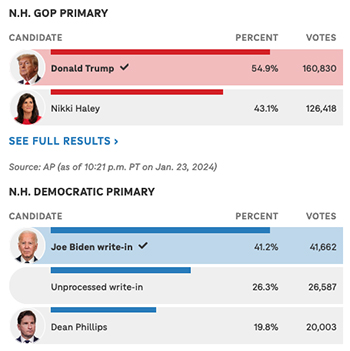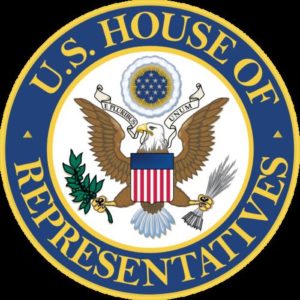By Jim Ellis — Wednesday, Jan. 24, 2024
President
 New Hampshire: Trump, Biden Win — Former President Donald Trump successfully won the New Hampshire Republican primary last night and did so by about 12 percentage points, but his performance is apparently not enough to convince former UN Ambassador Nikki Haley to leave the race.
New Hampshire: Trump, Biden Win — Former President Donald Trump successfully won the New Hampshire Republican primary last night and did so by about 12 percentage points, but his performance is apparently not enough to convince former UN Ambassador Nikki Haley to leave the race.
In her concession speech, Haley pledged to continue moving forward and several times referenced going to her home state of South Carolina as a place that could reverse the political tide. Polling, however, suggests that she is not as strong there as she was in New Hampshire.
For the Democrats, President Joe Biden, despite not being on the primary ballot, won the primary with write-in ballots that tallied just over 67 percent of the vote. US Rep. Dean Phillips (D-MN), who said he had no fundamental disagreement with the president over issues but believes Democrats should have a choice particularly with an 81-year old in office, secured just over 20 percent of the vote. Author Marianne Williamson attracted the remaining votes, just under 4 percent.
The New Hampshire primary yielded a record Republican turnout. The final participation count could reach 320,000. The previous record of 284,120 was set in 2016. The final Democratic turnout number will only be in the 100,000 range.
House
NE-1: Gov. Nominee to Challenge Rep. Flood — State Sen. Carol Blood (D-Bellevue), who was the 2022 Democratic gubernatorial nominee and lost to now-Gov. Jim Pillen (R), 59-36 percent, announced that she will now challenge Rep. Mike Flood (R-Norfolk) in the state’s 1st District that surrounds the Omaha metropolitan area on three sides. Flood was elected in a 2022 special election after Rep. Jeff Fortenberry (R) resigned. He won a full term in November with 58 percent of the vote. Blood’s candidacy gives the Democrats a credible challenger in what is considered a safe Republican seat.
Rep. Flood will be favored for re-election. The 1st District carries an R+17 rating from the FiveThirtyEight data organization. Dave’s Redistricting App calculates a partisan lean of 56.7R – 40.4D. The Daily Kos Elections site ranks NE-1 as the 72nd most vulnerable seat in the Republican Conference.
Governor
North Dakota: One In, One Out — After Gov. Doug Burgum (R) on Monday announced that he will not seek a third term, other North Dakota politicos began to make public their own political plans. At-Large US Rep. Kelly Armstrong (R-Bismarck) quickly declared that he will run for governor. Armstrong leaving the House means that 46 seats will be open for the next election.
Conversely, Attorney General Drew Wrigley (R), also viewed as one of the top potential contenders to succeed Gov. Burgum, announced that he will not run for governor, instead opting to seek re-election to his current position. Former state senator and ex-congressional candidate Tom Campbell (R) will also run for governor.
The Republican statewide nominating convention is scheduled for April 6. The ND primary is set for June 11.
States
Louisiana: Redistricting Map Signed Into Law — Meeting the court-ordered requirement to draw a new majority minority seat in Louisiana, Gov. Jeff Landry (R) yesterday signed into law the legislature’s map. The new lines will cost the Republicans one seat, as an African American Democrat will be heavily favored to win a newly drawn 6th District that stretches from Baton Rouge all the way to Shreveport, cutting through the middle of House Speaker Mike Johnson’s (R-Benton) 4th CD.
Current 6th District Rep. Garret Graves (R-Baton Rouge) says he will run for the House, which likely means challenging Rep. Julia Letlow (R-Start) in the state’s newly drawn, and safely Republican, 5th CD. Rep. Graves also says he is considering filing a lawsuit against the new map.


